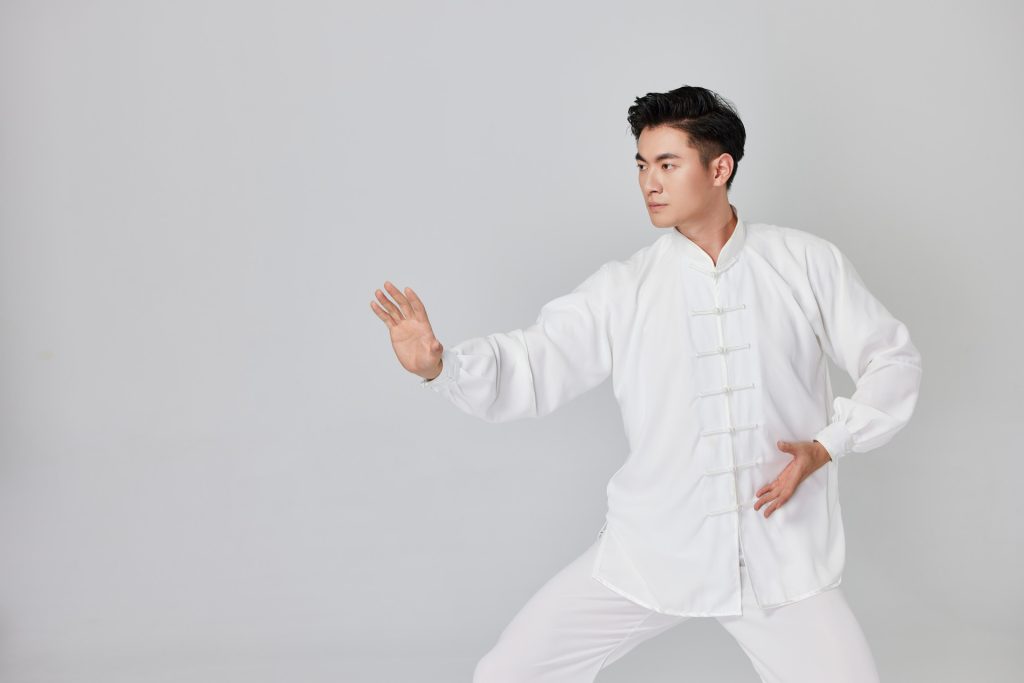Traditional Chinese sports can offer international students a unique way to connect with Chinese culture while also staying physically active. Here are some traditional Chinese sports that international students might enjoy:
These traditional Chinese sports offer international students an opportunity to immerse themselves in Chinese culture while also staying active and healthy. Many universities and community centers in China offer classes and workshops in these activities, making it easy for international students to participate and learn.
Tai Chi (太极拳)
For international students, Tai Chi offers a rich and multifaceted experience that extends beyond its literal meaning. Here’s a breakdown of what Tai Chi can mean for international students:
- At its core, Tai Chi is a form of martial art that emphasizes slow, flowing movements and deep breathing. For international students, practicing Tai Chi can provide a valuable opportunity to improve physical health and fitness. Its gentle, low-impact nature makes it accessible to people of all ages and fitness levels, allowing students to enhance their strength, flexibility, balance, and coordination.
- Tai Chi is often described as a moving meditation, incorporating elements of mindfulness and focused concentration. For international students navigating the challenges of studying abroad, Tai Chi can serve as a powerful tool for stress reduction and relaxation. Its rhythmic movements and emphasis on mindfulness can help students cultivate a sense of calmness, inner peace, and mental clarity amidst the demands of academic life and cultural adjustment.

- Tai Chi is deeply rooted in Chinese culture and philosophy, with origins dating back centuries. For international students living and studying in China, practicing Tai Chi offers a unique opportunity to connect with the country’s rich cultural heritage. Through Tai Chi, students can learn about traditional Chinese martial arts, Daoist principles, and concepts such as yin and yang, harmony, and balance, gaining insights into Chinese culture, history, and philosophy.
- Tai Chi is often practiced in group settings, providing opportunities for social interaction and community engagement. For international students, joining a Tai Chi class or club can be a great way to meet local residents, fellow students, and practitioners from diverse backgrounds. By sharing the experience of practicing Tai Chi together, students can forge new friendships, exchange cultural perspectives, and build a sense of belonging in their host community.
- Tai Chi is not just a physical exercise but also a practice of self-discovery and personal growth. Through regular practice, international students can deepen their understanding of their own bodies, minds, and emotions, cultivating self-awareness, self-discipline, and resilience. Tai Chi encourages students to listen to their bodies, honor their limitations, and embrace the present moment, fostering a sense of empowerment and well-being.
Qigong (气功)
For international students, Qigong offers a multifaceted experience that extends beyond its literal meaning. Here’s a breakdown of what Qigong can mean for international students:
- Qigong is an ancient Chinese practice that combines gentle movement, breath regulation, and meditation to cultivate physical, mental, and emotional well-being. For international students, practicing Qigong can provide valuable tools for maintaining health and reducing stress. Its gentle, flowing movements and focus on deep breathing promote relaxation, improve circulation, enhance flexibility, and boost energy levels, helping students cope with the demands of academic life and cultural adjustment.
- Qigong is often described as a moving meditation, emphasizing mindfulness, and presence in the present moment. For international students navigating the challenges of studying abroad, Qigong can serve as a powerful tool for stress reduction and emotional balance. By quieting the mind, calming the nervous system, and cultivating inner peace, Qigong helps students manage anxiety, improve focus, and develop resilience in the face of academic and personal challenges.

- Qigong is deeply rooted in Chinese culture, philosophy, and traditional Chinese medicine. For international students living and studying in China, practicing Qigong offers a unique opportunity to connect with the country’s rich cultural heritage. Through Qigong, students can learn about ancient Chinese healing practices, Daoist philosophy, and concepts such as Qi (vital energy), Yin and Yang (opposing forces), and the Five Elements, gaining insights into Chinese culture, history, and spirituality.
- Qigong is often practiced in group settings, providing opportunities for social interaction, community engagement, and cultural exchange. For international students, joining a Qigong class or group can be a great way to meet local residents, fellow students, and practitioners from diverse backgrounds. By sharing the experience of practicing Qigong together, students can forge new friendships, exchange cultural perspectives, and build a sense of belonging in their host community.
- Qigong is not just a physical exercise but also a practice of self-cultivation and personal growth. Through regular practice, international students can deepen their understanding of their own bodies, minds, and emotions, cultivating self-awareness, self-discipline, and inner peace. Qigong encourages students to listen to their bodies, cultivate intuition, and embrace holistic well-being, fostering a sense of empowerment and harmony in their lives.
Wushu
For international students, Wushu offers a multifaceted experience that extends beyond its literal meaning. Here’s a breakdown of what Wushu can mean for international students:
- At its core, Wushu is a term that encompasses various Chinese martial arts styles, encompassing both traditional and contemporary forms. For international students, practicing Wushu provides an opportunity to learn self-defense techniques, improve physical fitness, and develop martial skills. Wushu training typically involves learning forms (sequences of movements), sparring, and conditioning exercises, helping students build strength, agility, flexibility, and coordination.
- Wushu is deeply intertwined with Chinese culture, history, and philosophy, with roots dating back thousands of years. For international students living and studying in China, practicing Wushu offers a unique opportunity to connect with the country’s rich martial arts heritage. Through Wushu, students can learn about traditional Chinese martial arts styles, legendary masters, and philosophical concepts such as honor, discipline, and perseverance, gaining insights into Chinese culture and values.
- Wushu training requires discipline, focus, and dedication, both physically and mentally. For international students, practicing Wushu cultivates self-discipline, resilience, and a growth mindset. By setting goals, overcoming challenges, and striving for continuous improvement, students develop valuable life skills that extend beyond the training hall, empowering them to succeed academically and professionally.
- Wushu is not just about combat and self-defense but also about artistic expression and performance. Many Wushu styles incorporate elements of acrobatics, choreography, and aesthetics, creating visually stunning performances. For international students with a passion for the arts, practicing Wushu offers an opportunity to express creativity, develop stage presence, and showcase their talents through martial arts demonstrations and competitions.
- Wushu is often practiced in group settings, fostering a sense of community, camaraderie, and mutual support among practitioners. For international students, joining a Wushu class or club provides opportunities to meet local residents, fellow students, and martial arts enthusiasts from diverse backgrounds. By sharing the journey of Wushu training together, students form friendships, exchange cultural perspectives, and build a sense of belonging in their host community.
Kung Fu
For international students, Kung Fu, also known as Gongfu, represents a multifaceted journey encompassing physical discipline, cultural exploration, personal growth, and community connection. Here’s a comprehensive overview of what Kung Fu can signify:
- Kung Fu is renowned for its intricate techniques, fluid movements, and physical conditioning. For international students, practicing Kung Fu offers an opportunity to develop strength, flexibility, agility, and coordination through rigorous training. Whether learning traditional forms (sequences of movements), practicing sparring techniques, or honing self-defense skills, Kung Fu fosters physical discipline and martial prowess.
- Kung Fu is deeply rooted in Chinese culture, history, and philosophy, with origins dating back centuries. For international students living and studying in China, practicing Kung Fu provides a gateway to explore the country’s rich martial arts heritage. Through Kung Fu, students can delve into the teachings of ancient masters, learn about philosophical concepts such as yin and yang, and gain insights into Chinese cultural values, ethics, and spirituality.
- Kung Fu is not just about physical prowess but also about mental discipline, self-awareness, and personal growth. For international students, practicing Kung Fu cultivates resilience, perseverance, and inner strength. By facing challenges, overcoming obstacles, and pushing past limitations, students develop confidence, focus, and a growth mindset that empowers them to tackle academic, professional, and personal goals.
- Kung Fu encompasses a diverse range of styles, each with its own unique forms, techniques, and aesthetic qualities. For international students with a passion for the arts, practicing Kung Fu offers an outlet for creative expression, self-discovery, and mastery. Whether performing intricate forms with grace and precision or choreographing dynamic demonstrations, Kung Fu allows students to showcase their talents and connect with audiences through the beauty and power of martial arts.
- Kung Fu is often practiced in a communal setting, fostering a sense of camaraderie, mutual respect, and shared purpose among practitioners. For international students, joining a Kung Fu school or club provides opportunities to connect with local residents, fellow students, and martial arts enthusiasts from diverse backgrounds. By training together, students form friendships, exchange cultural perspectives, and build a supportive community that extends beyond the training hall.
Dragon Boat Racing
For international students, Dragon Boat Racing offers a unique and culturally rich experience that goes beyond its literal meaning. Here’s a comprehensive breakdown of what Dragon Boat Racing can represent:
- Dragon Boat Racing has a long history in Chinese culture, dating back over 2,000 years. It is traditionally associated with the Dragon Boat Festival (端午节), which commemorates the death of the poet and minister Qu Yuan. For international students, participating in Dragon Boat Racing provides a valuable opportunity to immerse themselves in Chinese cultural traditions, rituals, and folklore, gaining insights into the country’s rich history and heritage.
- Dragon Boat Racing is a team sport that requires coordination, communication, and collaboration among team members. For international students, participating in Dragon Boat Racing fosters a sense of camaraderie, unity, and mutual support. Working together to paddle the boat, synchronize their strokes, and reach the finish line builds bonds and friendships among teammates, transcending language and cultural barriers.

- Dragon Boat Racing is a physically demanding sport that requires strength, endurance, and stamina. For international students, training for and participating in Dragon Boat Racing offers an opportunity to improve physical fitness, build cardiovascular health, and develop resilience. The intense paddling, rhythmic motion, and adrenaline rush of racing provide a thrilling and exhilarating experience, pushing participants to their limits and fostering a sense of accomplishment.
- Dragon Boat Racing is often accompanied by vibrant celebrations, music, and cultural performances, creating a festive atmosphere of joy and excitement. For international students, participating in Dragon Boat Racing festivals and events offers a chance to experience the colorful pageantry, traditions, and customs of Chinese culture. From dragon boat processions and drum ceremonies to food stalls and cultural exhibitions, Dragon Boat Racing festivals provide a memorable and immersive cultural experience.
- While rooted in Chinese culture, Dragon Boat Racing has become a global phenomenon, with competitions and festivals held in countries around the world. For international students, participating in Dragon Boat Racing events fosters cross-cultural exchange, friendship, and understanding. Interacting with teams from different countries, sharing experiences, and competing together in the spirit of sportsmanship promotes international cooperation and solidarity, building bridges between diverse cultures and communities.


